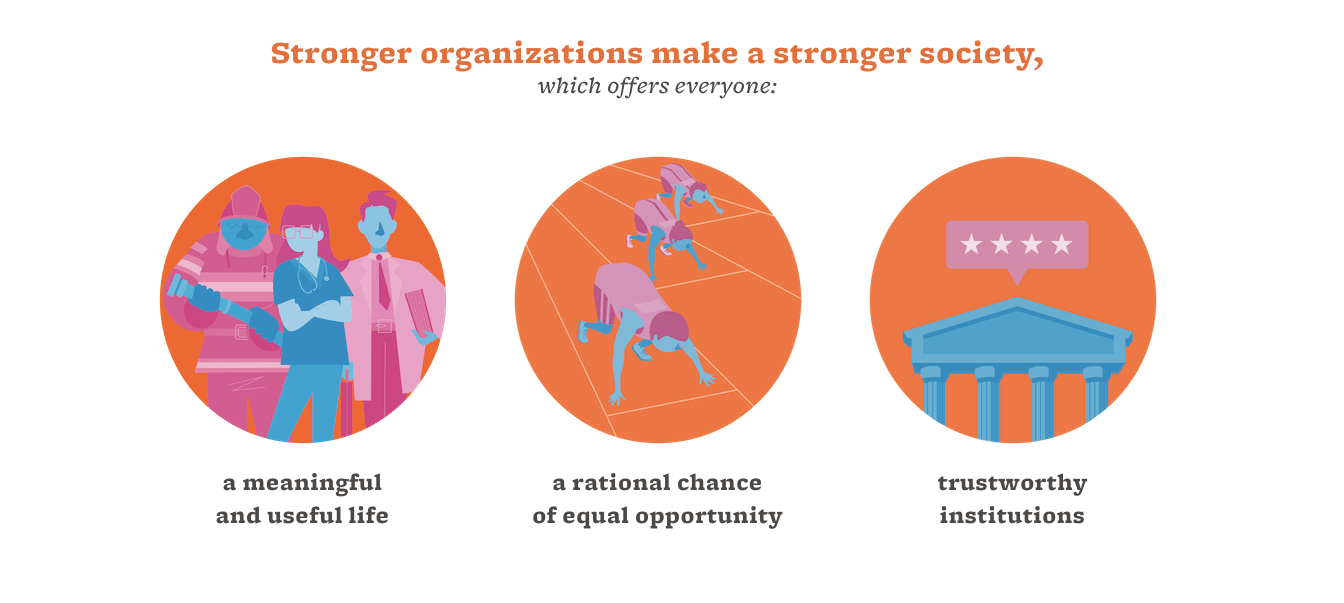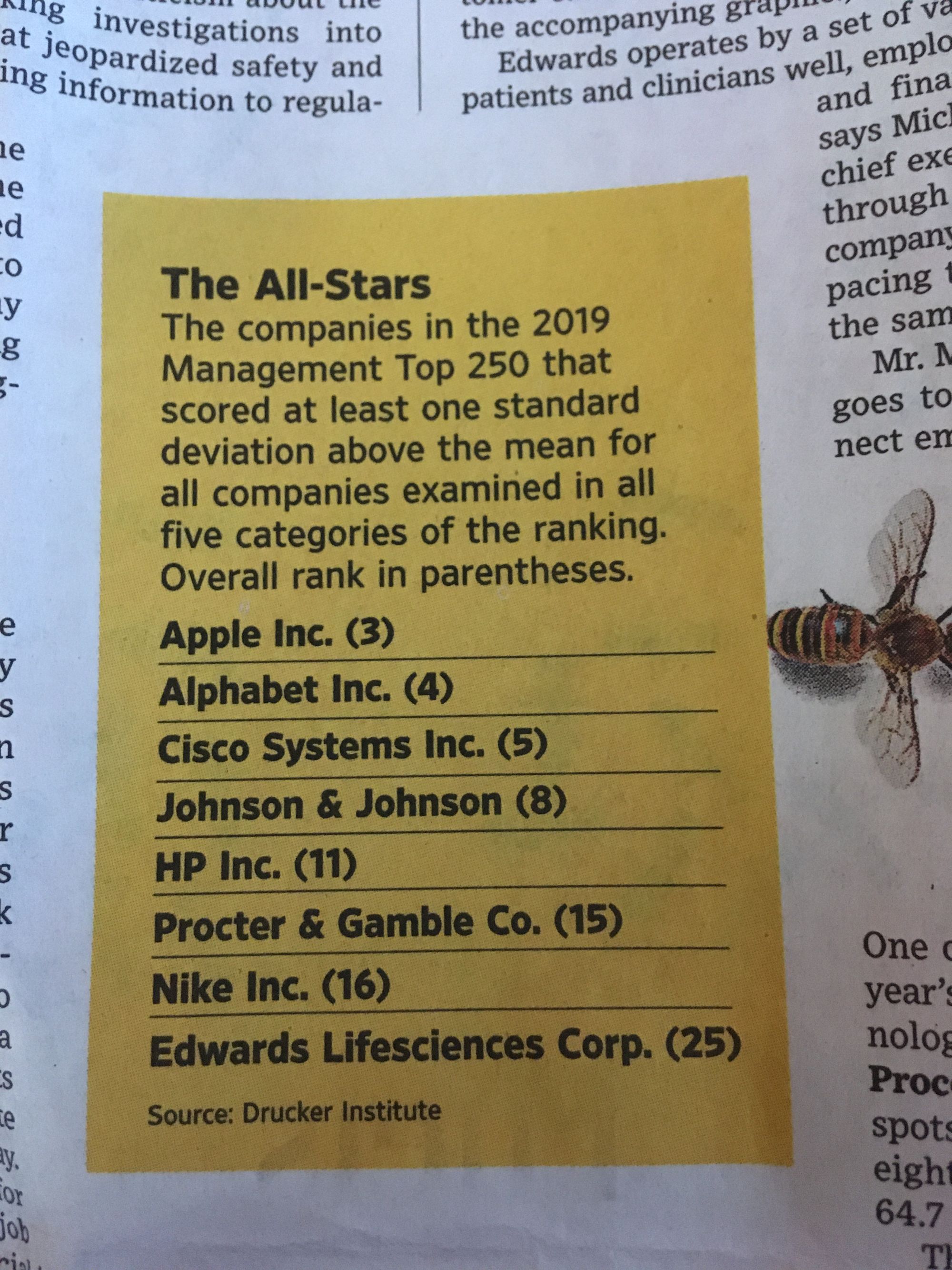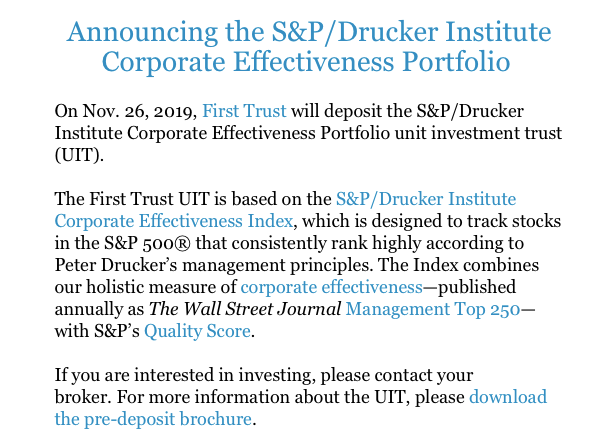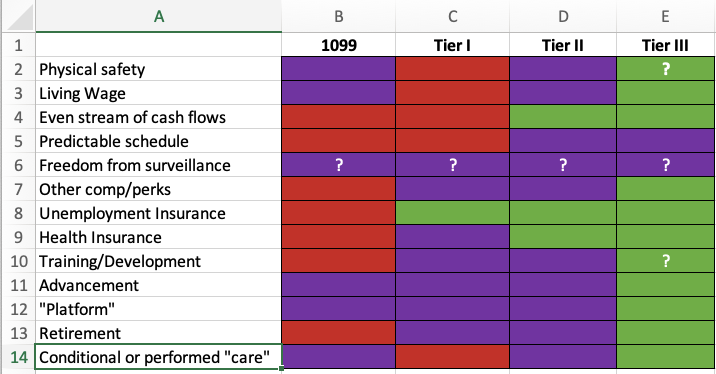Dead (White) Men Talking: Members Only #13
December 24, 2020 edit: This post went live on December 15, 2019, and I’m moving it outside of the paywall today.. It includes my 2019 critique of the WSJ/Drucker Institute Management 250. My 2020 view is coming soon — when “soon” is measured in pandemic time.
A book, a list, some updates and links, and my warmest thanks for your support.
A deep(er) dive cul-de-sac
Earlier this year, clients and prospective clients started asking if I had read Trillion Dollar Coach (library) (Indiebound)
No, I hadn’t. At first, I filed it away, under “Who Has Time.”
However, like High Output Management, I became curious. Why was it coming up frequently? Who is the book for?
I made time.
There’s a lot going on in this loving semi-biography of the late Silicon Valley executive Bill Campbell. Too much to fit into one newsletter.
So, over the next couple of issues, my ruminations on coaching turn to Trillion Dollar Coach.
I’ve written a bit about coaching: it is task-relevant, context-relevant feedback, and structured accountability. Good coaching enables coachees to leverage feedback and level up their performance.
I often encounter a (flawed) belief system about coaching: it a uniform service and unalloyed good. In my circles, You Should Want a Coach. Or even, You Must Need a Coach.
In this vision, The Coach has a magical Great and Powerful Oz-like ability to solve your problems.
And I’ve seen something that feels zeitgeisty: a notion that a coach is a person who should crack down on you. Hard.
Like a drill sergeant. Or the mean wizard.

This year, this came up with two prospective clients, very different people, from different cities/ecosystems.
After initial conversations, each sent me a thoughtful note. The two notes were nearly identical, though I received them months apart.
They liked me, they really liked me. They felt that they could trust me.
Lovely, right?
And, sorry, but they were looking for someone who would be tough on them. And I didn’t seem like I’d be tough enough.
I filed this under “Huh, Maybe I Should Consider My Presentation.” And, “What’s Wrong With Non-Brutal Accountability?” And “I’m Not For Everyone.”
Then, I met “Jim,” who sits on the board of an organization that was seeking coaching for their chief executive.
After we had talked a bit, Jim leaned forward, intense, and asked, “What’s it like when you have to be really tough on someone? When you have to tell someone that they’re a REAL JERK? To their face?”
Jim had also read Trillion Dollar Coach.
Aha. Was Trillion Dollar Coach about Brutal Accountability?
Spoiler alert: no.
Bill Campbell was a master manager and tech executive, and former college football coach. Late in Bill’s career, venture capitalist John Doerr issued him an invitation:
Venture firms often have “entrepreneurs in residence,” bright, usually young, technologists who work at the firm while they noodle over their next big idea. Why not have an executive in residence, John thought, someone who was seasoned in operations and strategy, to help the firm’s startups through the ups and downs of growth (or lack therof)?”
Adam Grant, in the Foreword to Trillion Dollar Coach
The book is full of stories about Bill rolling up his sleeves, getting involved. Helping people to develop to their fullest.
In numerous organizations, Campbell became part of managing team dynamics, hiring and firing, setting goals and strategy, and helping executives to make career choices.
Of course, this is what seasoned managers do.
Early in my career, in a large organization, experienced managers worked like this too. Some were direct managers for my peers and me. Others were more senior people, seated outside of our reporting structures. People who were still willing to answer questions, give advice, or lend political capital to a project or cause.
Many I remember were in Bill’s age cohort; this was Standard Operating Procedure.
They were sort of intramural managers.
I’d wager that Bill saw this early in his business career at Kodak, still a Fortune 100 company when he joined them.
Given his background, it’s not a stretch that Bill was called “Coach.” His work described in the book is not, strictly speaking, executive coaching.
Bill didn’t work for any of their firms. He was an extramural (meta-mural?) manager who coached executives, more than he was an executive coach.
So, if you’re thinking about being a better manager, the book offers some examples of what it can look like to coach your team members.
Spoiler alert: yes, sometimes, with some people, “accountability” might mean delivering the hard truth. But that’s not the only coaching mode.
Trillion Dollar Coach serves to continue to abstract coaching as a function, and as a service-slash-profession. So if you wish you had a coach, or want to find one, this book is probably not going to be all that helpful.
Also, the authors repeatedly say that Bill worked with executives pro-bono, to give back to an industry that had enriched him.
As you can imagine, I’ll come back to that.
The “Management Top 250”
I believe that it’s Year 3 for the WSJ Management Top 250, a ranking of the “best-run companies today.”
And it’s Year 2 for me to say, well, I have questions.

Per the Drucker Institute website, the 250 “best-run” companies operate according to the principles of “the late management guru Peter Drucker.”

Ok.
The Management Top 250 ratings are based on evaluations of “customer satisfaction, employee engagement and development, innovation, social responsibility and financial strength.”

New this year: red-flagged companies. After getting feedback on last year’s list, they’re flagging companies that rank in the lowest 25% of any of the categories.
And yet.
Peter Drucker is, inconveniently, dead. So his loved ones can’t hug him.
And I can’t ask him what he thinks about the value of Innovation at top-ranked Amazon.
Drucker died in 2005. Could he have imagined a Customer Satisfaction that requires delivery drivers to relieve themselves in bottles, and warehouse workers to be injured, and killed, on the job?
I guess when employees march because a company’s actions don’t align with its statements of purpose, it’s a form of engagement. Good on you, Nike (#16).
In addition to having to let go of numerous executives after reports of discrimination and sexual harassment, young female athletes on Nike’s brand-burnishing track team have reported being starved and humiliated by an abusive coach.
And, oh yeah, separately, the US Anti-Doping Agency banned Nike’s top coach from track for 4 years.
Is there a “rational chance of equal opportunity” at Alphabet (#4), where many — some say half — are contractors?
We can’t ask Peter Drucker about the rankings, or whether the process that produces them comports with his vision of well-functioning workplaces.
That said, I smell a theme. Andy Grove, Bill Campbell, and Peter Drucker are three dead white men whose “principles” are being elevated as aspirational standards.
We should all be asking whether this makes sense.
Why am I unsurprised
As I pretty much predicted last year in Rankings are Garbage — the Management Top 250 is now an investment opportunity. Hmmm.

I am a complete WSJ fangirl. So, I don’t love the editorial pages. But the WSJ breaks and dives deep into major workplace stories, above and beyond beating the average.
If you don’t want to subscribe, ask a librarian about free online access, possibly from your home.
That said, I wonder how we should really view the Management Top 250. Reporting? Editorial? Advertorial?
Coming Soon, part 1
Over the summer, I experimented with posting a short piece every day, “One Good Thing” that I had read, heard, seen, or thought.
This was fun. I’m riding into 2020 with plans for a weekly Warm Take for supporting members of On Management.
The Warm Take is my low-end media analysis about a newsworthy — or newsy — management/workplace story.
I’ll share what’s reported, and what I’m seeing. And, I’ll look beyond the story to consider what we don’t know, or can’t know. They’ll go out on Sunday mornings.
The first one, Away with her, is here. The next one will land in your inbox.
Part deux
<jazzhands>Office Hours is now AMA</jazzhands>
Lessons learned via Office Hours: people who support my newsletter are thoughtful, smart, and nice.
Lessons learned about Office Hours: you’re not here for the swag. I’ve been setting aside one day a month, and have never spent the entire day on the phone.
Maybe once a month is too much? I’ve kept the schedule for the first half of 2020, though I’m floating between different weekdays.
Also, I’m changing the name, lol rebranding, to AMA. These calls are opportunities to Ask Me Anything about work, people management and so forth.
Office Hours, I mean AMAs, work for me: I love to hear from you. Beyond connecting, I get more input about trends in work and people management.
AMAs follow the Chatham House Rule:
When a meeting, or part thereof, is held under the Chatham House Rule, participants are free to use the information received, but neither the identity nor the affiliation of the speaker(s), nor that of any other participant, may be revealed. which are designed to create open and confidential conversations.
Chatham House website
You may book here. So that I can prepare for the 45 minute discussion, I typically send couple of questions and ask for your (tweet-length) answers.
Paradoxically, links that do not break my heart (completely)
- Mary Cain’s I Was the Fastest Girl in America, Until I Joined Nike gives me hope.
Mary and her peers have the bravery — and the support — to speak about experiences they should not be having.

- This Is What Racism Sounds Like in the Banking Industry, by Emily Flitter at The New York Times. Ricardo Peters and Jimmy Kennedy are also brave, and I’m glad to hear their voices. May they also be supported.
- And you know what, we sure can’t see all the moving parts in the story about two Google employees who were placed on administrative leave, and then fired. But, if an employee is brave enough to invite colleagues into a “discussion with management,” why not?
(This is a new thought for me. I see many potential benefits to peer support in discussions about performance improvement, for example.)
A few more links
- Why Chasing The Good Life Is Holding Us Back, With Lauren Berlant (Ep. 35) Her notion of cruel optimism resonates. I’m eagerly awating a copy of Cruel Optimism (library) (Indiebound).
- Anna Weiner’s Uncanny Valley: A Memoir (Indiebound) comes out in January, is the unique view of a young woman in the entry level workplace, as she makes a NY Tech to Silicon Valley move.
I really liked it, and hope to interview Anna. More to come on this book, which I have a feeling will pair well with Cruel Optimism. - Somewhere, I heard that the next season of Michael Lewis’ Against the Rules podcast will address The Coach, beyond sports, but can’t find a good reference to link. I’m pretty sure I already recommended Season 1, which was about referees. And it’s not (only) about sports.
Welcome to new readers — the archive is here.
Thanks to all of you, so much, for reading and supporting the newsletter — financially, and through your questions, suggestions, and other thoughtful feedback.
I love getting your email. Let me know if I can make On Management work, better, for you.
Thanks,
Anne Libby
P.S. The quoted text in the header is from the Drucker Institute website. I love this Harriet Rubin interview with Drucker.
Subscribe to the free newsletter

I love winter. Go ahead, @ me.




